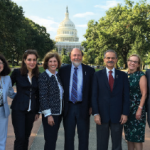Despite those initial efforts, the CMS finalized the new plan to include Part B drug costs in reimbursement adjustments. It, thus, became clear that Congress must act to fix the policy by making a legislative clarification that MIPS bonus and penalty adjustments should not be applied to Part B drug payments. The ACR has renewed its push by organizing a comprehensive strategy to get this done. We immediately organized a sign-on letter to Congress from 14 physician specialties, created a coalition of similarly minded specialties and again met with members of Congress. To magnify our voice, the ACR placed an op-ed written by me and the president of the American Academy of Ophthalmology in a prominent Washington, D.C., publication read by key congressional influencers.
We are also partnering with patient groups—who have many patient advocates who are eager to get involved in these causes—not just from rheumatology but from across all of the affected conditions, along with state and local rheumatology societies, into a broad coalition working to remedy this new and dangerous policy. The latest coalition letter organized by the ACR drew support from 109 physician and patient groups from across the spectrum of the impacted specialties. Although many are getting involved on an organizational level, to be successful, lawmakers must take action, which means they first need to hear from you—their constituent.
Everyone Can Do Something
With continual challenges comes the need for continual advocacy on the part of the ACR, and we need you and every other member of the ACR and ARHP to be a part of this on behalf of your patients.
Because of our expertise with targeted therapies and understanding of the impact of these medications on the lives of patients with many chronic diseases, rheumatologists and rheumatology health professionals are uniquely positioned and qualified to inform policymakers and to stand up for patients’ needs and the rheumatology subspecialty, and to educate policymakers about best policies. Who else but us?
Everyone can do something. Maybe you’d like to do something quick like sending a pre-filled email to your lawmakers through the ACR Legislative Action Center at rheumatology.org/Advocacy/Legislative-Action-Center. Or maybe you prefer to help by investing in RheumPAC and perhaps even attending a RheumPAC-sponsored event that will allow you to talk with an elected official about the challenges you are facing in your practice. You can even get your patients involved if they are affected and have an interest in advocacy.


